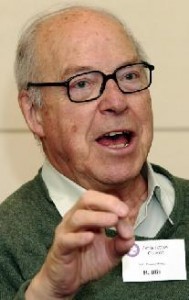Interview with Dr. Hans Blix, former Secretary-General of IAEA
Apr. 19, 2010
by Yumi Kanazaki
Dr. Hans Blix, former Secretary-General of the IAEA, is visiting Hiroshima to take part in the InterAction Council meeting which opens on April 18. "A welcome change is being created," said Dr. Blix, referring to the global conditions surrounding nuclear weapons. The following is the summary of my interview with Dr. Blix.
How do you assess the global momentum for nuclear disarmament, with the NPT Review Conference taking place in May?
In fact, the recent moves with regard to disarmament are not new. After the era of military orientation of former President George W. Bush ended, it can be said that the world has reverted to the measures his father had been pursuing.
However, the signing of a new disarmament treaty by the United States and Russia, and the Nuclear Security Summit hosted by President Obama in which national leaders came together to appeal for nuclear disarmament, such developments represent a very welcome change. This new environment will serve as a tail wind to the NPT Review Conference.
The leaders of the United States and Russia have described the nuclear disarmament obligations stipulated in Article 6 of the NPT as a binding obligation. The Review Conference will not be a spectacular success, its prospects for success permit more optimism than the previous conference held in 2005.
Are the nuclear issues involving North Korea and Iran negative factors?
The outlook for the North Korean case is volatile. The issue of Iran is even more difficult. Uranium enrichment by Iran is destabilizing the entire Middle East. In addition to talks designed to make the Middle East a region free of weapons of mass destruction, talks should also be held to make the region free of uranium reprocessing and enrichment.
Do you think the world can extricate itself from the nuclear deterrence argument?
In order to reduce nuclear weapons, it is vital to replace nuclear deterrence with conventional weapons. Given the powerful conventional forces of the United States, the "umbrella" for Japan doesn't have to involve nuclear weapons.
However, disarming conventional forces is also a critical task. The world's military expenditure is about $1400 billion, of which the United States accounts for 45%.
The present-day threats come from terrorism by non-state actors; we do not have a situation in which a large-scale war could occur. We should elevate our level of security by removing distrust among states through confidence building, while lowering the levels of military forces.
What is the significance of former leaders gathering in Hiroshima to discuss the abolition of nuclear weapons?
Many members of the InterAction Council had already been born when the atomic bomb was dropped on Hiroshima. They experienced the Cold War as well as the end of the Cold War. I would like our meeting to be an opportunity for the elders of our generation to speak out forcefully to once again advance nuclear disarmament. For this, Hiroshima is the most appropriate venue.
(Originally published on April 15, 2010)
Dr. Hans Blix, former Secretary-General of the IAEA, is visiting Hiroshima to take part in the InterAction Council meeting which opens on April 18. "A welcome change is being created," said Dr. Blix, referring to the global conditions surrounding nuclear weapons. The following is the summary of my interview with Dr. Blix.
How do you assess the global momentum for nuclear disarmament, with the NPT Review Conference taking place in May?
In fact, the recent moves with regard to disarmament are not new. After the era of military orientation of former President George W. Bush ended, it can be said that the world has reverted to the measures his father had been pursuing.
However, the signing of a new disarmament treaty by the United States and Russia, and the Nuclear Security Summit hosted by President Obama in which national leaders came together to appeal for nuclear disarmament, such developments represent a very welcome change. This new environment will serve as a tail wind to the NPT Review Conference.
The leaders of the United States and Russia have described the nuclear disarmament obligations stipulated in Article 6 of the NPT as a binding obligation. The Review Conference will not be a spectacular success, its prospects for success permit more optimism than the previous conference held in 2005.
Are the nuclear issues involving North Korea and Iran negative factors?
The outlook for the North Korean case is volatile. The issue of Iran is even more difficult. Uranium enrichment by Iran is destabilizing the entire Middle East. In addition to talks designed to make the Middle East a region free of weapons of mass destruction, talks should also be held to make the region free of uranium reprocessing and enrichment.
Do you think the world can extricate itself from the nuclear deterrence argument?
In order to reduce nuclear weapons, it is vital to replace nuclear deterrence with conventional weapons. Given the powerful conventional forces of the United States, the "umbrella" for Japan doesn't have to involve nuclear weapons.
However, disarming conventional forces is also a critical task. The world's military expenditure is about $1400 billion, of which the United States accounts for 45%.
The present-day threats come from terrorism by non-state actors; we do not have a situation in which a large-scale war could occur. We should elevate our level of security by removing distrust among states through confidence building, while lowering the levels of military forces.
What is the significance of former leaders gathering in Hiroshima to discuss the abolition of nuclear weapons?
Many members of the InterAction Council had already been born when the atomic bomb was dropped on Hiroshima. They experienced the Cold War as well as the end of the Cold War. I would like our meeting to be an opportunity for the elders of our generation to speak out forcefully to once again advance nuclear disarmament. For this, Hiroshima is the most appropriate venue.
(Originally published on April 15, 2010)








